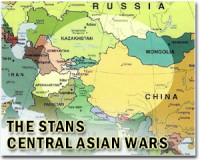| . |  |
. |
Washington (AFP) June 23, 2010 General Stanley McChrystal's dismissal on Wednesday marked a stunning fall for the US commander in Afghanistan whose fearless opinions about waging an unpopular war proved his undoing. The 57-year-old who made his name in the secret world of special operations had routinely set teeth on edge with his blunt talk about the war's progress -- or the lack of it. But his latest courting of controversy, in a magazine profile that portrays him as a commander almost as much at war with President Barack Obama's White House as with the Taliban, has now derailed a stellar career. Published by Rolling Stone, "The Runaway General" quotes McChrystal's aides as mocking Vice President Joe Biden, calling the president's national security adviser "a clown," and saying McChrystal was "disappointed" in Obama after their first meeting in the Oval Office. McChrystal himself is quoted as saying he felt "betrayed" by US Ambassador Karl Eikenberry, a former commander in Afghanistan who raised pointed objections to his onetime subordinate's war strategy in a memo leaked to The New York Times. "I extend my sincerest apology for this profile," the four-star general said in a statement from Kabul. "It was a mistake reflecting poor judgment and should never have happened." The White House swiftly summoned him to Washington, where Obama removed him of his duties after a half-hour meeting. It was one of the highest profile dismissals of a wartime commander since president Harry Truman sacked General Douglas MacArthur at the height of the Korean War. McChrystal, who headed 142,000 foreign troops in Afghanistan, had won backing in Europe, where nations participating in the NATO-led International Security Assistance Force said this was no time to change command in the war against the Taliban. He also had the backing of Afghan leader Hamid Karzai, with his spokesman calling him the "best commander" during the nearly nine-year war. Surprisingly, for a man whose army career was forged in the normally hermetic world of top-secret US special operations, McChrystal has not been a stranger to controversy. Brilliant, focused and fanatically disciplined, he was made the top commander in Afghanistan in June 2009 after his predecessor, General David McKiernan, was pushed aside as too old school for what was rapidly becoming another losing war in the "graveyard of empires." Chosen to bring new ideas about counter-insurgency warfare to the fight, McChrystal sought outside experts for advice and devised a new strategy by September that called for an additional 40,000 troops, warning that anything less risked "mission failure." That was even more troops than his predecessor had demanded, and it set off a storm within the new administration, fearful of being drawn into another quagmire just as it was moving to extricate US forces from Iraq. Obama ordered his own months-long strategy review, while Biden and others in the administration advocated a smaller force on the ground and greater reliance on drones to go after Al-Qaeda in its Pakistani havens. In the end, Obama gave his general most of what he asked for. But McChrystal told Rolling Stone, "I found that time painful. I was selling an unsellable position." McChrystal came to Afghanistan after a stint as director of the Joint Chiefs of Staff. He owed his ascent to the Afghan command to brilliant success as the Joint Special Operations Commander, where he transformed the hunt for Al-Qaeda in Iraq to a deadly efficient high-tech operation, much of which remains classified. He has been credited with running the successful 2006 operation that killed Abu Musab al-Zarqawi, the leader of Al-Qaeda in Iraq, and with smashing Al-Qaeda and Iranian-backed cells in 2007 and 2008. But special forces have also been accused of detainee abuses under McChrystal's command. Questions over that issue last year reportedly held up his appointment to his current post. The son of a general and a graduate of West Point, McChrystal entered the army in 1976. He held key commands interspersed with time off for study at the Kennedy School of Government at Harvard University, the Council on Foreign Relations, and the Naval War College. He was the chief of staff of the combined joint task force that conducted "Operation Enduring Freedom," the US-backed campaign that ousted the Taliban from power in Afghanistan in late 2001.
Share This Article With Planet Earth
Related Links News From Across The Stans
 Afghanistan president backs Petraeus as NATO commander
Afghanistan president backs Petraeus as NATO commanderKabul (AFP) June 23, 2010 President Hamid Karzai's government said Wednesday it was "looking forward" to working with the new head of NATO forces in Afghanistan despite warning earlier against changing commanders. War hero General David Petraeus takes over from General Stanley McChrystal, who resigned at the White House over disparaging remarks he made about top officials in President Barack Obama's administration in ... read more |
|
| The content herein, unless otherwise known to be public domain, are Copyright 1995-2010 - SpaceDaily. AFP and UPI Wire Stories are copyright Agence France-Presse and United Press International. ESA Portal Reports are copyright European Space Agency. All NASA sourced material is public domain. Additional copyrights may apply in whole or part to other bona fide parties. Advertising does not imply endorsement,agreement or approval of any opinions, statements or information provided by SpaceDaily on any Web page published or hosted by SpaceDaily. Privacy Statement |